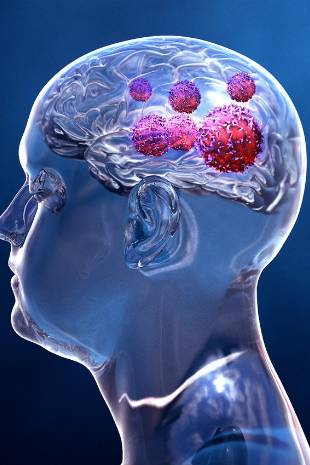


A brain tumour is a mass or collection of abnormal cells in the brain. The human skull is a rigid structure designed to protect the brain. But any growth inside a restricted space like a skull can cause problems. A brain tumour cancer can be malignant or benign. When tumours grow inside your brain, it can put pressure inside your skull, causing brain damage. In some cases, it can be life-threatening. There can be different brain cancer causes, depending on which specialists determine the brain cancer treatment course in India. Brain cancer can be categorized as primary or secondary. It is called a primary brain cancer when the tumour originates in the brain. On the other hand, it is a secondary brain cancer when the cancer cells grow to the brain from another organ, like breast or lung. It is also known as a metastatic brain tumour.
Keep on reading as we discuss everything about brain cancer treatment in India,besides its types, symptoms, diagnosis, and brain cancer stages.Also check out the process of immunotherapy for brain cancer in India.
As said, there are two different types of tumours of the brain: Primary and Secondary.
Primary brain cancers originate in the brain and can develop from our glands, nerve cells, membranes surrounding the brain, and the brain cells. They can be cancerous or benign. In older people, the most common types of primary brain cancers include gliomas and meningiomas. Gliomas develop from glial cells. Meningiomas are more common in women than men and occur in people between the ages of 40 and 70. Once diagnosed, brain tumour treatment in India should be immediately commenced.
Secondary brain cancers don’t originate in the brain but spread from other organs into the brain. This phenomenon is also known as metastasizing, and the following cancers can metastasize to the brain:
● Skin cancer
● Kidney cancer
● Breast cancer
● Lung cancer
Secondary tumours can be malignant. The treatment for brain cancer will depend on the type of tumour you have. If it is a primary tumour, the doctor will directly examine the brain for its source. And if it is a secondary tumour, the treatment includes curing the brain as well as preventing metastasizing.
Symptoms of cancer of the brain depend on the size and location of the brain. Some tumours invade the brain tissue causing direct damage, while some put pressure on the surrounding brain. When a tumour puts pressure on the brain tissue, you may experience the following symptoms:
| Headaches - when you wake up / while you are sleeping |
| A change in mental functioning |
| The weakness of a limb |
| Seizures |
| Confusion |
| Blurred vision |
| Difficulty walking |
| Changes in mood, behaviour, emotions, and personality |
| Trouble speaking |
| Numbness on one side of the body |
| Loss of bladder control |
| Loss of balance |
| Hand tremors |
| Uncontrollable movements |
| Eye problems |
| Dizziness or vertigo |
| Difficulty swallowing |
| Decreased alertness |
| Changes in the ability to smell, taste, or hear |
| Difficulty reading or writing |
| Memory loss |
| Clumsiness |
The doctor will look into your medical history and perform a physical examination. The physical examination includes a detailed neurological test to determine whether your cranial nerves are intact. While doing this, the doctor will also evaluate your memory, coordination and muscle strength. Based on the results of the physical examination, further tests will be performed, which could include:
● Biopsy
● Skull X-rays
● Angiography
● MRI of the Head
● CT Scan of the Head
Brain cancers are staged based on their cell type and grade as they seldom spread to other parts of the body. In general, the stages range from 0-4, with stage-4 cancer indicating that the tumour has spread to another organ.
The brain tumour treatment in India will depend on:
● Stage of the cancer
● Your general health
● Location of the tumour
● Size of the tumour
● Type of the tumour
In the majority of cases, brain cancer treatment India leads to surgery. The primary objective of treatment for brain cancer is to remove as much cancer as possible without damaging the healthy parts of the brain.
Denvax is particularly useful for brain cancers, including WHO grade IV glioma, also called as Glioblastoma multiforme (GBM).
GBM is advanced stage glioma, and is the most invasive and infiltrative type of cancer. GBM is often referred to as grade IV astrocytoma. These are the most aggressive tumors that present unique challenges one of which is the blood brain barrier (BBB). Most chemotherapeutic agents are unable to cross this BBB. Denvax works by crossing the BBB and making the cancer-fighting dendritic cells available to the tumor cells. Denvax is a safe protocol, it involves patient’s own mononuclear cells transformed into dendritic cells that are trained to do cancer killing. This is a customized treatment protocol and is a safe option. It is cancer immunotherapy, the 4th modality of cancer treatment.

